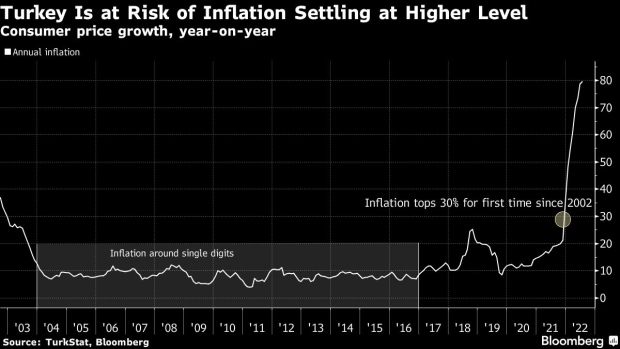Sep 4, 2022
Turkish Inflation Is Set to Peak Above 80% With More Angst Ahead
, Bloomberg News

(Bloomberg) -- Sign up for the New Economy Daily newsletter, follow us @economics and subscribe to our podcast.
Turkish inflation exceeded 80% for the first time since September 1998, as policies that prioritized economic growth and cheap lending exact a toll on the lira and price stability.
Annual inflation quickened for a 15th consecutive month to 80.2% in August, up from 79.6% in July, according to data released on Monday by Turkey’s statistics agency. The median forecast of economists surveyed by Bloomberg was 81.2%.
President Recep Tayyip Erdogan, who believes that cheaper borrowing costs can slow inflation instead of pushing it higher, has kept exports and employment at the top of the agenda. That comes even as the cost-of-living crisis unfolding in Turkey poses a threat to his appeal less than a year before elections.
Turkey has the world’s deepest negative interest rates when adjusted for inflation. But worried by “some loss of momentum” in the economy, the central bank already slashed its benchmark rate last month by 100 basis points to 13%.
The lira traded steady after the data release. It’s down 27% against the dollar this year, the worst performer in emerging markets.
For much of the year, the $820 billion economy has powered on despite consumer inflation rising to levels last seen during a period of political instability before Erdogan came to power. Turkey’s growth has outpaced most peers so far this year, with gross domestic product rising an annual 7.6% in the second quarter.
What Bloomberg Economics Says...
“It’s unlikely the gains are done yet. We expect higher inflation in the coming months amid rising energy costs and after the central bank cut interest rates. This should see the year-on-year level hitting a peak in October before retreating to 69% at year-end.”
-- Selva Bahar Baziki, economist. Click here for more.
Turkish officials have so far remained unfazed, calling the price gains transitory and blaming Russia’s invasion of Ukraine for causing a global spike in food and commodity costs.
Erdogan has asked for “some patience and more support,” saying last week that inflation will start to fall at the start of the new year.
Much of the damage has been self-inflicted. Even stripping out volatile items like food and energy, Turkish inflation has been surging, with the core index shooting past 66% in August, a record high in data going back to 2004.
Retail inflation in Turkey’s most affluent city Istanbul last month rose to almost 100% from a year earlier.
The longer-term damage from the crisis, however, may be in the way it warps price expectations. An August survey by the central bank found that respondents anticipate inflation to be at over 24% as far out as two years into the future.
The government raised its forecast for price growth to 65% in 2022 -- from 9.8% previously -- and only sees it slowing to about 25% next year, according to a new three-year plan published in the Official Gazette on Sunday. It’s not expected to be below 10% until 2025.
Another challenge is the threat of an economic slowdown ahead.
While major banks from Goldman Sachs Group Inc. to Morgan Stanley have revised their 2022 outlook for Turkey higher after faster-than-forecast growth in the second quarter, the risk of a recession in Europe is among factors that can put the brakes on the economy in the rest of the year.
Consumer prices could come under pressure again if authorities unleash more stimulus or in case of another shock to energy costs.
“The somewhat lower-than-expected inflation in Turkey in August is welcome news for the government and the central bank,” said Per Hammarlund, chief emerging markets strategist at SEB AB. “However, with energy prices set to rise again going into the winter months, the problem of high inflation has not been solved.”
(An earlier version of this story corrected to say that food inflation slowed.)
©2022 Bloomberg L.P.





